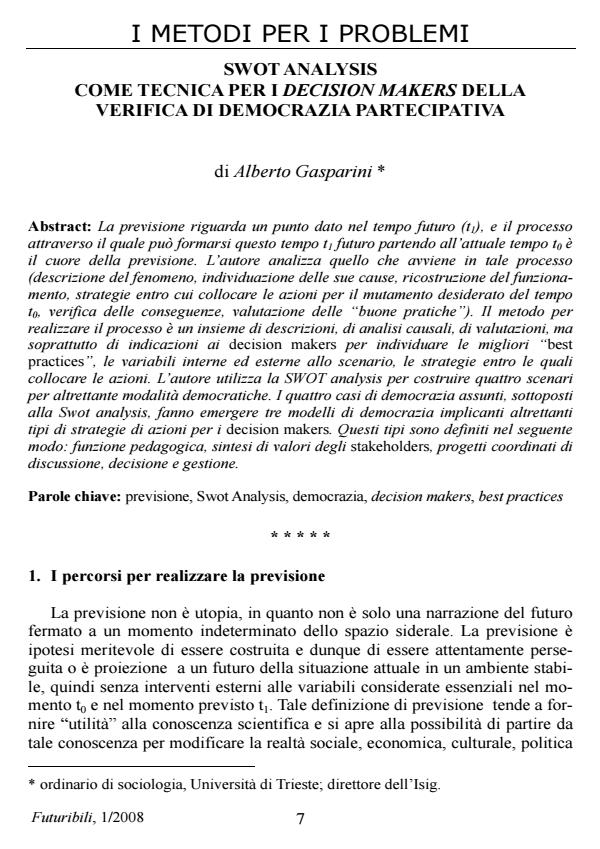Swot analysis come tecnica per i decision makers della verifica di democrazia partecipativa
Journal title FUTURIBILI
Author/s Alberto Gasparini
Publishing Year 2009 Issue 2008/1
Language Italian Pages 53 P. 7-59 File size 596 KB
DOI 10.3280/FU2008-001002
DOI is like a bar code for intellectual property: to have more infomation
click here
Below, you can see the article first page
If you want to buy this article in PDF format, you can do it, following the instructions to buy download credits

FrancoAngeli is member of Publishers International Linking Association, Inc (PILA), a not-for-profit association which run the CrossRef service enabling links to and from online scholarly content.
Swot Analysis as a technique for decision makers in the assessment of democratic practices - Prediction involves a given point in future time (t1), and the process by means of which the future time t1 may come about, starting from the present time (t0), lies at the heart of prediction. The author analyses what happens in that process - description of the phenomenon, identification of its causes, reconstruction of the mechanisms, strategies in which to frame the actions required for the desired change in the time t0, assessment of the consequences and evaluation of good practices. The method to achieve the process is a blend of descriptions, causal analyses and evaluations, but above all indications to decision makers to identify the best practices - the scenario’s internal and external variables and the strategies in which to frame actions. The author uses SWOT analysis to build four scenarios, each corresponding to a democratic model. When subjected to SWOT analysis, the four democratic models yield three models of democracy, each implying a type of strategy for the action of decision makers. These types are defined as: pedagogic function, synthesis of stakeholders’ values and coordinated projects of discussion, decision and management. Tasks and limits of prediction in the intelligence cycle, by Umberto Gori This text examines the question of prediction with particular reference to international relations. Observations about the turbulent and complex nature of the present-day international system are followed by an analysis of the problems facing the prediction of a chaotic system. The discussion then turns to intelligence analysis and the tasks and limits of prediction in the intelligence cycle, and is completed with a review of the methods useful for understanding political systems and the prediction of decisions. The conclusions make brief reference to a number of new discoveries and interpretations in advanced physics to throw doubt on our ability to grasp the profound essence of reality. Futuribili, 1/2008
- Italian wines and Asia: policy scenarios and competitive dynamics Armando Maria Corsi, Nicola Marinelli, Veronica Alampi Sottini, in British Food Journal /2013 pp.342
DOI: 10.1108/00070701311314183
Alberto Gasparini, Swot analysis come tecnica per i decision makers della verifica di democrazia partecipativa in "FUTURIBILI" 1/2008, pp 7-59, DOI: 10.3280/FU2008-001002